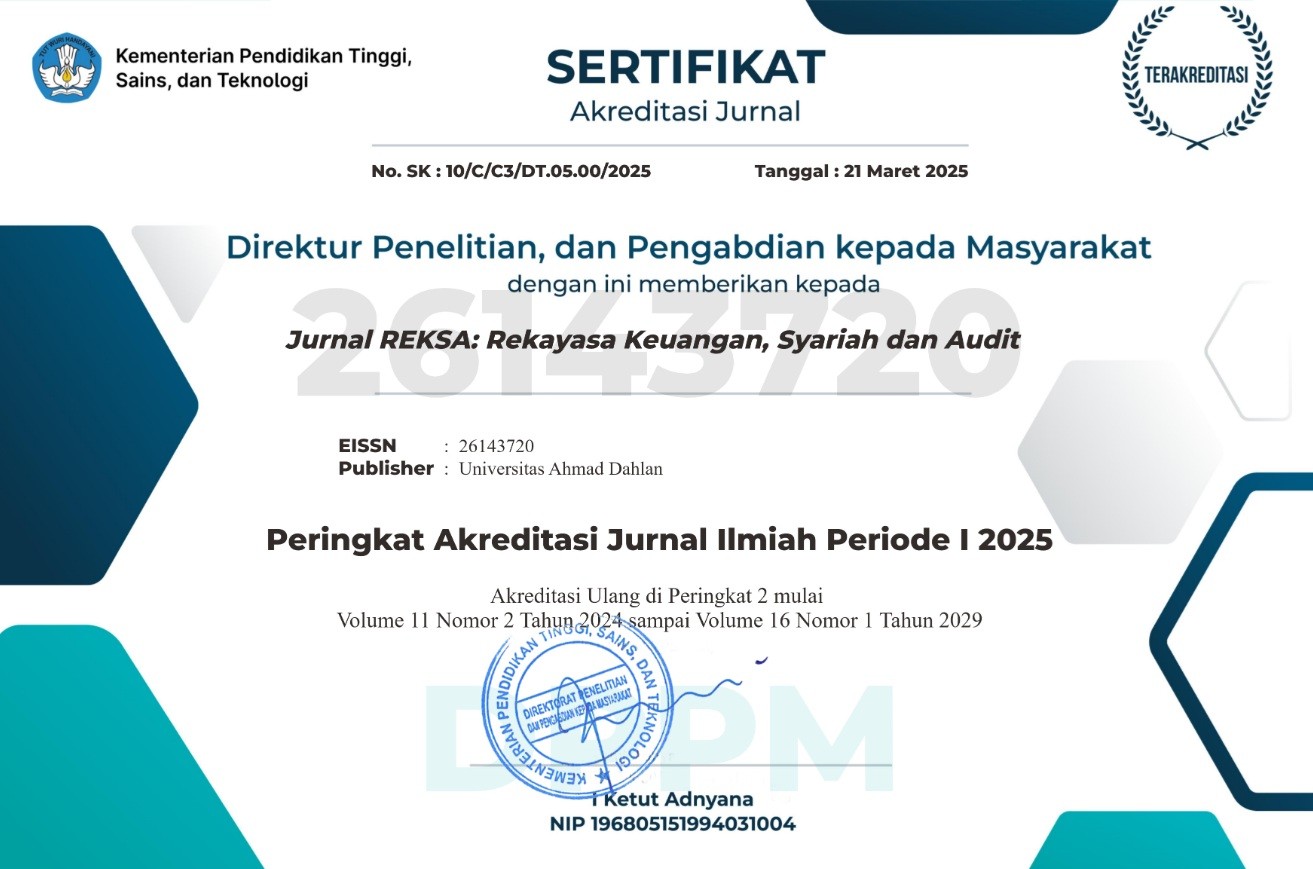THE EFFECT OF CORPORATE GOVERNANCE ON BANK EFFICIENCY IN INDONESIA
DOI:
https://doi.org/10.12928/j.reksa.v5i2.2551Keywords:
bank efficiency, corporate governance, board size, audit committee size, institutional ownershipAbstract
The objective of this study is to investigate the effect of board size, audit committee size, and institutional ownership as corporate governance variables on bank efficiency in Indonesia.
The populations in this research are all banks listed in Indonesia Stock Exchange (IDX) during the period of 2010-2013. Using purposive sampling, 28 banks are selected as the sample. The data are secondary data from the financial statements and annual reports of the banks. Panel data regression is employed to analyze the data.
The findings show that board size has significant negative effect on the efficiency of banks. Other corporate governance variables, audit committee size and institutional ownership, give no significant influence on bank efficiency in IndonesiaReferences
Al-Matar, E. M.,Al-Swidi, A. K., &Fadzil, F. H. (2014). The effect of board ofdirectors characteristics, audit committee characteristics and executive committee characteristics on firm performance in oman: an empirical study. Asian Social Science, 10(11), 149-171.
Anderson, R.C., Mansi, S.A., and Reeb, D.M. (2004). Board characteristics, accounting report integrity, and the cost of debt. Journal of Accounting and Economics, 37( 3), 315-342.
Anwar, M. and Herwany, A. (2012). The determinants of successful bank profitability in indonesia:empirical study for provincial government’s banks and private non-foreign banks. 1st International Conference on Business and Management Research: 'Facing 21st Century Challenges.
Batesse, G. E., and Coelli, T.J. (1995). A model for technical inefficiency effects in a stochastic frontier production function for panel dataâ€. Empirical Economics, 20, 325-332.
Bonin, J. P., Hasan, I., & Wachtel, P. (2004). Bank performance, efficiency, and ownership in transition countries. BOFIT Discussion Paper, 7.
Constantinescu, L. A.& Morar, I. A. (2009). Managerial challenges in the relationship between performance and efficiency. Review of General Management, 9(1), 112-120.
Fama, E F. (1980). Agency problem and theory of the firm. Journal of Political Economy, 88(2), 288-307.
Filipovic, D and Filipovic, I. (2008). External auditing and audit committee as mechanisms in corporate governance. An Enterprise Odyssey International Conference Proceedings.
Hidayat, W. (2013, October 31). Bank bumn harus tingkatkan efisiensi. Republika Online. Retrieved from http://www.republika.co.id/berita/ekonomi/keuangan/13/10/31/mviv2e-bank-bumn-harus-tingkatkan-efisiensi
Jensen, M.C., and Ruback., R.S. (1983). The market for corporate control: the scientific evidence. Journal of Financial Economics, 11(4), 5-50.
McConnel, J. & Servaes, H. (1990). Additional evidence on equity ownership and corporate value. Journal of Financial Economics, 27, 595-612.
Mokhtar, H.S.A., Abdullah, N., & Alhabshi, S. M. (2008). Efficiency and competition of islamic banking in malaysia. Humanomics, 24(1), 28-48.
Pearce, J. H., & Zahra, S. A. (1992). Board composition from a strategic contingency perspective. Journal of Management Studies, 29(2), 411-438.
Poudel, R.P., & Hovey, M. (2012). Corporate governance and efficiency in nepalese commercial banks, International Review of Business Research Papers, 9(4), 53-64.
Pratikto, H. & Sugianto, I. (2011). Kinerja efisiensi bank syariah sebelum dan sesudah krisis global berdasarkan data envelopment analysis. Jurnal Ekonomi Bisnis, 16(2),108-117.
Spong, K., De Young, R., and Sullivan, R.J., (1996). What makes a bank efficient? a look at financial characteristics and bank management and ownership structure. Financial Industry Perspectives, Federal Reserve Bank of Kansas City.
Taktak, S. and Triki, M., (2012). The effect of board and ownership structure on the efficiency of banks in tunisia: the stochastic frontier approach. International Journal of Business and Management, 7(16), 139-150.
Tanna, S., Pasiouras, F. & Nnadi, M., (2011).The effect of board size and composition on the efficiency of UK banks. International Journal of the Economics of Business, 18(3), 441-462.
Wild, J. J., Shaw, K. W., & Chiappetta, B. (2009). Principles of accounting (19th ed.). Singapore: McGraw-Hill.
Downloads
Published
How to Cite
Issue
Section
License
- Authors retain copyright and grant the JURNAL REKSA right of first publication with the work simultaneously licensed under a Creative Commons Attribution License (CC BY-SA 4.0) that allows others to share (copy and redistribute the material in any medium or format) and adapt (remix, transform, and build upon the material) the work for any purpose, even commercially with an acknowledgment of the work's authorship and initial publication in JURNAL REKSA.
- Authors are able to enter into separate, additional contractual arrangements for the non-exclusive distribution of the journal's published version of the work (e.g., post it to an institutional repository or publish it in a book), with an acknowledgment of its initial publication in JURNAL REKSA.
- Authors are permitted and encouraged to post their work online (e.g., in institutional repositories or on their website) prior to and during the submission process, as it can lead to productive exchanges, as well as earlier and greater citation of published work (See The Effect of Open Access).




